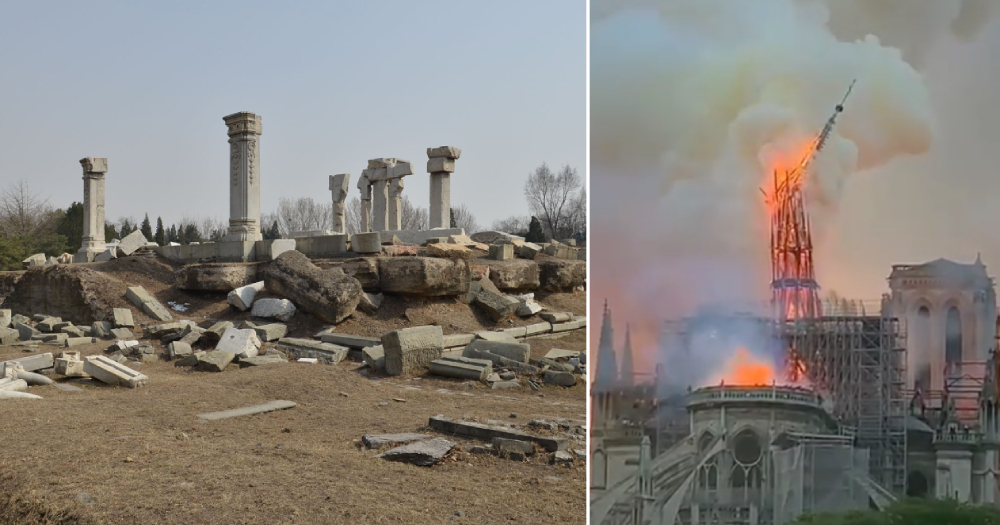When the 850-year-old Notre Dame cathedral in Paris, France went up in flames on Monday, April 15, it sparked a worldwide outpouring of grief.
style="display:block; text-align:center;"
data-ad-layout="in-article"
data-ad-format="fluid"
data-ad-client="ca-pub-8151337340296717"
data-ad-slot="5584281553">
But at the same time, it evoked among many Chinese people a painful memory of an episode in history: British and French troops set fire to the Old Summer Palace, or the "Gardens of Perfect Brightness", as it was called in Chinese, and plundered its national treasures.
What is the Old Summer Palace?
The Old Summer Palace -- known for its large gardens and extensive works of art -- was five times the size of the Forbidden City.
 How the Old Summer Palace supposedly looked like originally. (Image via Takefoto.cn
How the Old Summer Palace supposedly looked like originally. (Image via Takefoto.cn
But during the Second Opium War in 1860, it was looted and then set on fire by British and French troops.
The Chinese government has consistently reminded the Chinese people of the humiliation suffered under the hands of the Western imperial powers.
What's left of the historical site serves as a powerful symbol of that painful piece of history.
style="display:block; text-align:center;"
data-ad-layout="in-article"
data-ad-format="fluid"
data-ad-client="ca-pub-8151337340296717"
data-ad-slot="5584281553">
Karma for France?
While there were many who are saddened over the Paris fire, prompting a hashtag #Notre Dame de Paris and Me to go viral on China's Twitter-like Weibo, many Chinese people also thought the blaze was karma for France.
Here are some of their responses:
 Screenshot via Wei Tian Xia/Weibo
Screenshot via Wei Tian Xia/Weibo
"A very, very long time ago, a group of robbers set my backyard on fire and stole all its precious treasures. Today, their house is on fire, and I feel sorry for the lost artifacts. But I wasn't the one that started the fire. I sympathise with them, but I wouldn't donate. Because they owe it to those lost treasures and the people who died in the fire (referring to the Old Summer Palace)."
Here's another:
 Screenshot via Toutiao News/Weibo
Screenshot via Toutiao News/Weibo
"Some say the fire reminded them of the Old Summer Palace. Don't compare these two. The Old Summer Palace was ravaged by invaders, she carries too much of the Chinese people's emotional baggage. Notre Dame was damaged by their own people. Although they are both heritage of humanity, can they be put in the same category?"
style="display:block; text-align:center;"
data-ad-layout="in-article"
data-ad-format="fluid"
data-ad-client="ca-pub-8151337340296717"
data-ad-slot="5584281553">
And another:
 Screenshot via Wei Tian Xia/Weibo
Screenshot via Wei Tian Xia/Weibo
"180 years ago, the Chinese didn't think that the Old Summer Palace would be burnt so badly. Till this day, the French have not apologised, and have not returned our cultural relics. What happened to the Notre Dame was a pity. But why are people criticised for saying that what happened to the Old Summer Palace was a greater tragedy than Notre Dame? This is not narrow-minded nationalism. Does being magnanimous mean one should forget about the nation's history and humiliation?"
And one more:
 Screenshot via Wei Tian Xia/Weibo
Screenshot via Wei Tian Xia/Weibo
"The fire was just put out, and donations are already coming in from all over the world. There was barely any damage done to the cultural relics. This leads one to wonder."
style="display:block; text-align:center;"
data-ad-layout="in-article"
data-ad-format="fluid"
data-ad-client="ca-pub-8151337340296717"
data-ad-slot="5584281553">
All of mankind's loss
At the same time, many Chinese spoke out against such comments that evoked schadenfreude:
 Screenshot via Chen Di Winston/Weibo
Screenshot via Chen Di Winston/Weibo
"This response stems naturally from the long-term teaching of hatred in people."
 Screenshot via Chen Di Winston/Weibo
Screenshot via Chen Di Winston/Weibo
"I woke up in the morning to the news of the Notre Dame fire. I thought the comments would be those of sympathy. But I was shocked when I saw them. Many were happy seeing the tragedy. Seems like it's true that only 4 percent of the Chinese population have gone to university. I'm reminded of what Lu Xun (Chinese author) said before: "I've never seen the bad in the Chinese people, and I don't expect, nor do I believe that the Chinese will ever fall to this state."
 Screenshot via Chen Di Winston/Weibo
Screenshot via Chen Di Winston/Weibo
"Those who cheered after learning of the tragedy carry some pretty strong victim mentality. In recent history, only the Nazis were like this."
style="display:block; text-align:center;"
data-ad-layout="in-article"
data-ad-format="fluid"
data-ad-client="ca-pub-8151337340296717"
data-ad-slot="5584281553">
Old Summer Palace responds
The management of the Old Summer Palace took to their official Weibo account and said they "wholeheartedly hope that cultural relics can avoid disasters and be passed down from generation to generation".
A writer with state broadcaster CCTV also condemned such reactions, saying that those who took joy in the tragedy are simply "narrow-minded nationalists".
She also wrote that while it is important for China not to forget the humiliation it suffered, the Chinese people should not take pleasure in someone else's misfortune.
Yan Feng, a professor at Fudan University -- one of the top universities in China -- questioned the logic of those who feel that the Notre Dame fire was karma for the French who burnt down the Old Summer Palace.
 Screenshot via Yan Feng/Weibo
Screenshot via Yan Feng/Weibo
"Notre Dame was constructed in 1163, while the Old Summer Palace was destroyed in 1860. The ones who set the Old Summer Palace on fire were not the same ones who built Notre Dame. They were separated by 700 years. The French feudal separatists were in no way French according to modern-day standards. Every injustice has its perpetrator and every debt its debtor. Why should you let Notre Dame bear responsibility for the fire of the Old Summer Palace?"
style="display:block; text-align:center;"
data-ad-layout="in-article"
data-ad-format="fluid"
data-ad-client="ca-pub-8151337340296717"
data-ad-slot="5584281553">
Not the full story
However, much of the discussion left out a crucial part of Chinese history.
The Red Guards, a student-led paramilitary movement mobilised and guided by Mao Zedong -- who was the founder of the People's Republic of China -- destroyed many cathedrals built by Western missionaries in the early 20th century, according to Inkstone News.
This happened shortly after the launch of the Cultural Revolution in May 1966.
Thousands of artifacts were destroyed as well.
The act was motivated by an anti-feudalism campaign launched by Mao's Chinese Communist Party (CCP) to destroy the "Four Olds" (old ideas, old customs, old culture, old habits).
Mao wanted the "Four Olds" to be eliminated as they were a reminder of those who used to be in power.
He also believed that by replacing them with the "Four News", the nation would be rid of the old and be able to start on a fresh page.
Today, the Cultural Revolution was accepted by the Party as a "catastrophe", but the Chinese masses have not yet come to terms with the full scale of the tragedy.
This is partly because what they are familiar with is just a version of events that was approved by the Party.
Top image adapted via @european_country & Wikipedia
If you like what you read, follow us on Facebook, Instagram, Twitter and Telegram to get the latest updates.
